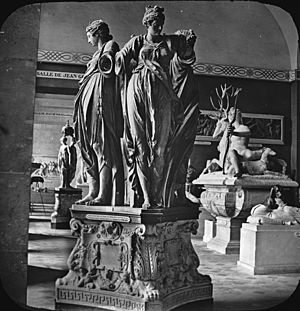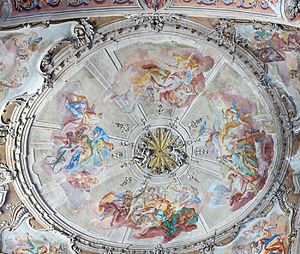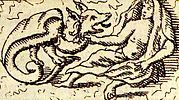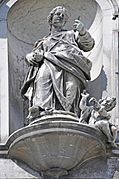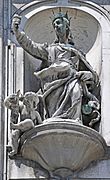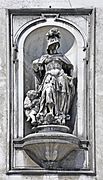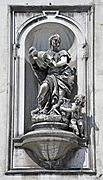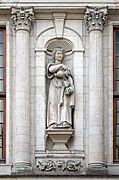Cardinal virtues facts for kids
The cardinal virtues are four important qualities of mind and character. Both ancient thinkers and Christian teachings talk about them. These virtues are prudence, justice, fortitude (courage), and temperance (self-control). They are seen as the main building blocks for living a good and moral life. The word cardinal comes from the Latin word cardo, which means "hinge." This shows that these virtues are like hinges that everything else swings on.
These ideas first came from the famous Greek philosopher Plato. He wrote about them in his book Republic. Later, another Greek philosopher, Aristotle, wrote more about them in his Nicomachean Ethics. The Stoics, another group of ancient philosophers, also recognized these virtues. In Christian tradition, these virtues are mentioned in the Bible in the books of Wisdom of Solomon and 4 Maccabees. Important Christian thinkers like Ambrose, Augustine of Hippo, and Thomas Aquinas also wrote about them. They connected them with other important Christian ideas called the theological virtues.
Contents
The Four Cardinal Virtues
Here are the four cardinal virtues and what they mean:
- Prudence (also called Wisdom): This is the ability to make good choices. It means thinking carefully about what to do in a situation. You consider the possible results before you act.
- Justice: This means being fair to everyone. It's about treating people equally and doing what is right. The Greek word for justice also means "righteousness."
- Fortitude (also called Courage): This is about being brave. It means having the strength to face fear, uncertainty, or difficult situations. It's about not giving up when things get tough.
- Temperance (also called Self-Control): This means having control over your desires and actions. It's about moderation and not doing too much of anything. Plato thought this was a very important virtue.
Virtues in Ancient Times
The four cardinal virtues were known as a group long before they were given the name "cardinal virtues."
Greek Philosophy
Plato connected the four cardinal virtues to different parts of a city and different parts of a person. In his book Republic, he described a good city.
- Temperance was important for all people. But it was especially linked to farmers and craftspeople. It also related to our basic desires.
- Fortitude was given to the warrior class. It was also linked to the spirited part of a person.
- Prudence was for the rulers of the city. It was connected to our ability to reason and think.
- Justice was different. It stood outside the groups and helped make sure all parts worked well together.
Plato sometimes included holiness as a virtue. He often linked it closely with justice.
Roman Philosophy
The Roman writer Cicero also wrote about these virtues in his book De Officiis.
The Roman Emperor Marcus Aurelius talked about them in his book Meditations. He believed these virtues were the true "goods" a person should focus on. He thought they were more important than wealth or luxury.
The Stoic philosophers also had similar ideas about virtues.
Virtues in the Bible
The ideas behind the cardinal virtues can be found in the Christian Bible.
In the New Testament
Wisdom is talked about a lot in the New Testament. For example, in 1 Corinthians 2, it says that God's wisdom is greater than human wisdom.
Justice is taught in the gospels. It is often translated as "righteousness."
The word for Fortitude that Plato used is not in the New Testament. But the Bible praises being steadfast and having patient endurance. It encourages believers to "act like men" (1 Cor. 16:13), meaning to be strong and brave.
Temperance is also in the New Testament. It is often translated as "sobriety" or "self-control."
Virtues in Christian Tradition
Christian moral teachings used ideas from the Old Testament books of Wisdom of Solomon and Fourth Maccabees. These helped them develop their thoughts on virtues. Ambrose, a Christian leader from the 300s, was one of the first to use the phrase "cardinal virtues."
Cardinal and Theological Virtues
The four cardinal virtues are different from the three theological virtues. The theological virtues are Faith, Hope, and Charity (Love). These are mentioned in the Bible in 1 Corinthians 13.
Sometimes, people list all seven virtues together. This group includes the four cardinal virtues (prudence, temperance, fortitude, justice) and the three theological virtues (faith, hope, charity). These are known as the seven virtues. The cardinal virtues came from ancient Greek philosophers. They were for anyone wanting to live a good life. The theological virtues, however, are specifically for Christians.
Some thinkers have tried to connect the cardinal and theological virtues. For example, Augustine of Hippo saw faith as a part of justice.
The famous Italian poet Dante Alighieri also tried to link them in his book Divine Comedy. He described a scene with a chariot and figures representing these virtues. The women in red, green, and white stood for the theological virtues. The four women in purple stood for the cardinal virtues.
Allegory
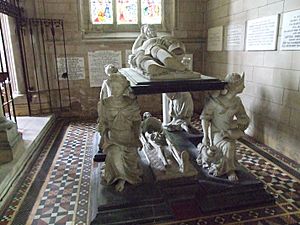
The Cardinal Virtues are often shown as female figures in art. They were a popular subject for sculptures on tombs. The symbols and names of these figures can change based on local traditions.
In many churches and artworks, the Cardinal Virtues are shown with special items:
- Justice
* A sword, a balance and scales, a crown.
- Temperance
* A wheel, a bridle and reins, vegetables and fish, a cup, water and wine in two jugs.
- Fortitude
* Armor, a club, a lion, a palm branch, a tower, a yoke, a broken column.
- Prudence
* A book, a scroll, a mirror, a serpent.
- The cardinal virtues as depicted on the tomb of Pope Clement II in Bamberg Cathedral
Some famous artworks showing these virtues include sculptures on the tomb of Francis II, Duke of Brittany, and the tomb of John Hotham. They were also shown in the garden at Edzell Castle.
- Allegories of the virtues
-
Prudence, on the facade of La Rochelle city hall
-
La Rochelle - HdV statue 1.jpg
Justice, on the facade of La Rochelle city hall
-
Fortitude, on the facade of La Rochelle city hall
-
Temperance, on the facade of La Rochelle city hall
See also
 In Spanish: Virtudes cardinales para niños
In Spanish: Virtudes cardinales para niños
- Cardinal and Theological Virtues (Raphael)
- Civic virtue
- Seven deadly sins
- Seven virtues
- Theological virtues
 | Charles R. Drew |
 | Benjamin Banneker |
 | Jane C. Wright |
 | Roger Arliner Young |


